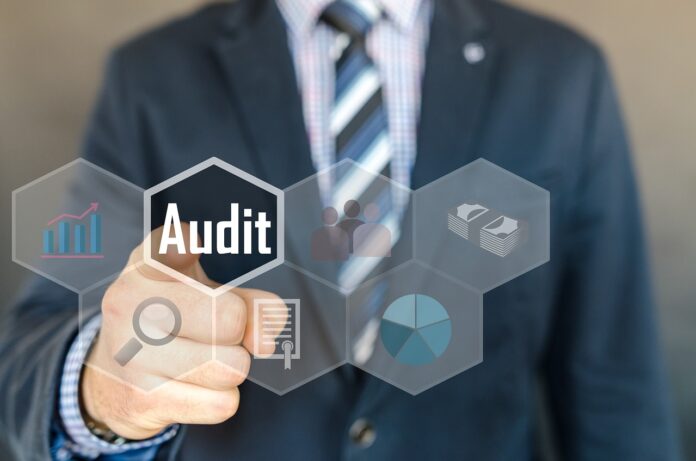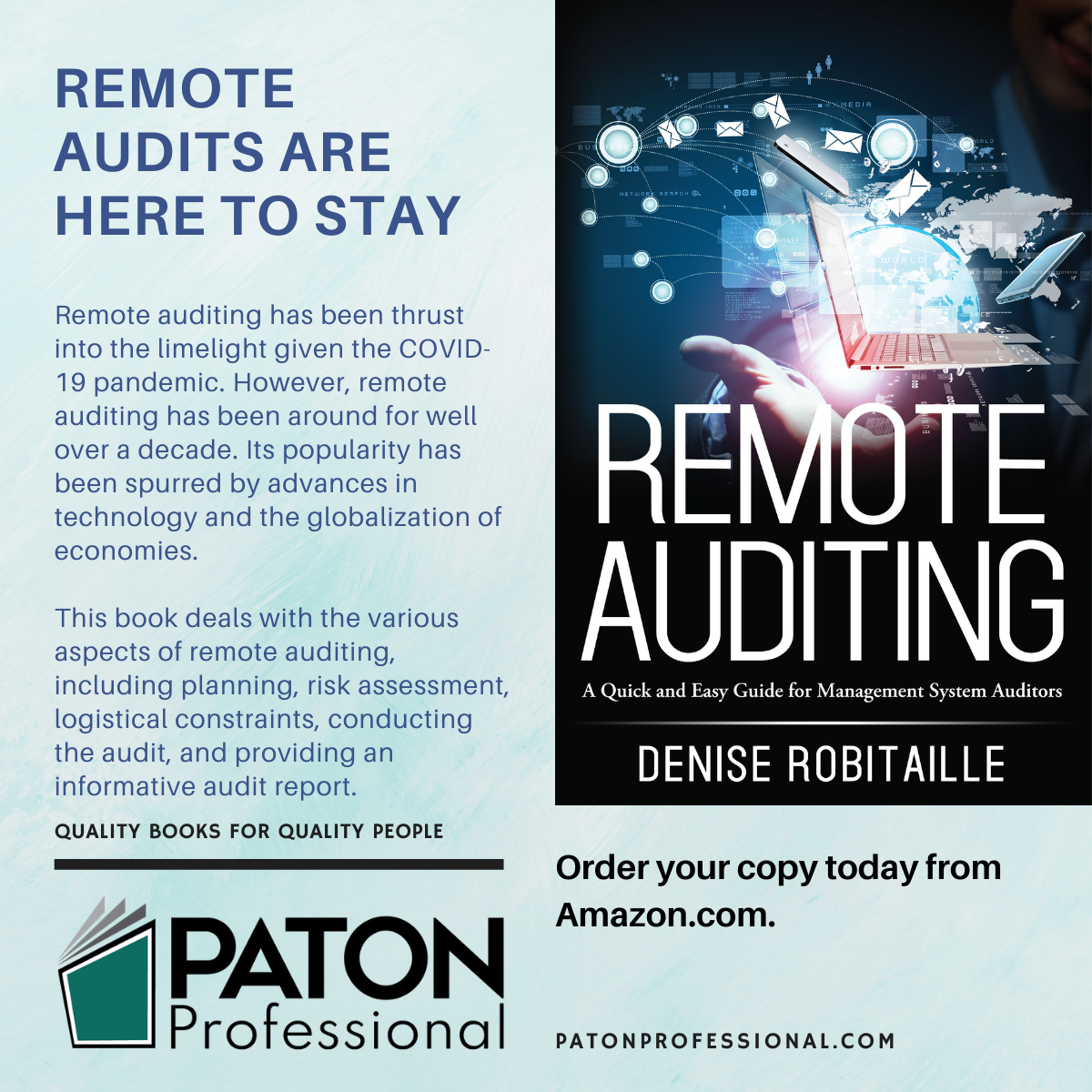By Susan Gorveatte
Introducing the Softer Side of Audits
What do you think about when you hear that an auditor is coming on site to perform an audit? Do you have visions of Darth Vader storming down a long corridor of the Death Star while John Williams’ “Imperial March” plays in your head? Maybe you know an auditor who is the opposite of Darth Vader and whitewashes everything. This kind of auditor barely skims the surface as they fly-over your organization, rubber-stamping the management system.
Darth Vaders and Rubber-Stampers are the two extremes; it doesn’t have to be that way. As auditors we need to be better than the Darth Vaders and Rubber-Stampers and find a happy balance between those two extremes.

If you want to provide audits that are value-added and provide guidance to your leadership team, you need to learn how to audit like a leader. That means understanding the principles of auditing, demonstrating the traits of a successful auditor, managing communication, and being a team leader.
The Principles of Auditing
According to ISO 19011:2018, “Auditing is characterized by reliance on a number of principles. These principles should help to make the audit an effective and reliable tool… by providing information on which an organization can act in order to improve its performance.” ISO 19011:2018 further explains that, “Adherence to these principles is a prerequisite for providing audit conclusions that are relevant and sufficient, and for enabling auditors… to reach similar conclusions in similar circumstances.”[1]
These principles are:
- Integrity
- Fair presentation
- Due professional care
- Confidentiality
- Independence
- Evidence-based approach
- Risk-based approach[2]
As a consultant and corporate trainer for 25 years, I worked with and trained too many auditors to count, yet I am still surprised when I meet internal auditors who tell me they are not aware of the guidelines documented in ISO 19011:2018, and have never heard of these quality principles. These seven principles can guide auditors as they conduct their audits. Understanding the spirit and intent of each principle will help auditors find the balance between their inner Darth Vader and Rubber-Stamper so they can conduct audits that bring value and spark positive change within the organization.
Demonstrating the Traits of a Successful Auditor
Just as organizations have minimum competency requirements for the employee roles within an organization, auditors should have a set amount of training and knowledge before being able to conduct audits. A “trained” auditor should have not only have certain skills and knowledge related to auditing (and how to conduct and lead audits, etc.) but also knowledge or experience in the related field of work. It is this audit knowledge, skills, and generic competence that makes a “trained” auditor. [3]
I often tell my audit workshop participants that I can make them a “trained” auditor but I can’t make them a “successful” auditor. The success of an auditor depends on their ability to demonstrate personal behavioral traits upon which the success of the audit will rely.[4] It is these personal traits that can make an auditor successful and balanced; collectively, these traits are the fulcrum between a Darth Vader and Rubber-Stamper.
The softer skills of auditing represent the approach and tone of the audit. The list of auditor soft skills required would include every synonym of patient, kind, tenacious, sincere, diplomatic, empathetic, versatile, and more.
I recently had a student in a workshop suggest another personal trait that would lead to audit and auditor success, it was “respectfully humorous.” Having a sense of humor can definitely help when conducting audits as long as the auditor acts with sensitivity and civility.
It is the combination of these traits that adds to the success of the audit. Think of using tenacity and sincerity at the same time—that is, being persistent while at the same time acting with genuine care so the auditee can feel that the auditor has their best interests in mind and are there to help. Another example could include using two soft skills that I find can be the most challenging: patience and versatility. When schedules change (and they frequently do), auditors may need to be flexible while at the same time attempting to accommodate the change in an understanding and calm way to ensure the audit objective will still be met.
It’s how the auditor blends and demonstrates these soft skills while still being focused on meeting the audit objective that provides the pathway to audit success. The auditor should use all of their soft skills while collecting the required audit evidence through interviews, observation, and records review. It is hard work, but worth it.
Managing Communication
Effective communication is critical during an audit.
Think about it, if an auditor asks a question in a bold or brash way, it is likely going to paint a negative tone for the audit, and the auditee may react to that behavior and feel the audit is punitive or demeaning, or they may feel anxious or upset. However, if an auditor asks a question with diplomacy and sincerity, the auditee is more likely to respond with more volume and depth of information and be more collaborative throughout the audit process.

Good communication between the auditor and auditee begins with a good introduction. It sounds so easy, but because everyone has different backgrounds and behavioral styles, collaborating and connecting can be challenging. While it may come naturally to some, to others, not so much. Remember, an auditee may not know the audit process and may be nervous. A solid introduction and an ability to build good rapport can go a long way toward great two-way communication and, ultimately, audit success. So, take the time to get to know the auditee, have a formal introduction, and always be clear about the purpose of the audit while putting the auditee at ease.
Other ways to manage communication are included in figure 2.
Keeping the channels of communication open and positive will help the audit run smoothly. Remember, good answers begin with good questions. Ask a variety of different questions in a variety of styles. Try to use open-ended questions and be genuinely curious. Of course, this will lead to the need for good listening skills.

When listening to an auditee’s response to a question, try and listen with an open mind. Remember what was said and use positive body language (see figure 3) to send positive cues. Paying attention to the speaker will help the auditor comprehend and retain the information and guide information sharing so the audit runs smoothly and effectively.
Managing communication through a strong introduction, good questions, and active listening ensures the audit is efficient and the evidence collected is captured appropriately.
Being a Leader of a Team
Auditing is more than just asking questions and writing answers. Often, auditors are the face of the management system. Auditors also often work in teams. This requires some additional skills to ensure the teams are effective in achieving the audit objective. Because leaders’ habits spill over onto, or ripple out to, the team members, leaders have to walk the talk and lead by example.
Team leaders need to listen to their team members and be prepared to manage any conflict or issues as they arise. Team leaders need to be decisive and have an ability to prioritize to ensure tasks are accomplished on time. Team leaders need to be great time managers. Team leaders also need to be able to motivate other team members to accomplish tasks on time (like report writing, etc.), which is critical to the success of the audit. Finally, audit team leaders should develop and encourage other leaders so they, too, can move into a leadership role when auditing.
Conclusion
To find the balance between the Darth Vader and Rubber-Stamper auditor, the qualities of a successful auditor rely on adhering to ISO 19011:2018 principles, pulling all the soft skills from your personal auditor toolkit, managing communications effectively, and developing leadership skills to drive the audit team to success. Before you know it, you will be auditing like a leader!
About the Author

Susan Gorveatte, president of Gorveatte Consulting Inc., has been training small, medium, and large-sized businesses on ISO 9001 quality management systems for more than 25 years. She has been successful blending the right amount of art and passion needed to create a formula to success for organizations to consistently meet and even exceed client expectations. Her functional experience includes business start-up and growth, team problem solving, quality management systems documentation, implementation, training, and auditing. To learn more about Susan and Gorveatte Consulting Inc., check out www.gorveatteconsulting.com, Instagram @gorveatteconsultinginc, and get connected on LinkedIn here: https://www.linkedin.com/in/susan-gorveatte-08137a2a/.
References
[1] International Organization for Standardization. “ISO 9011:2018: Guidelines for Auditing Management Systems.”, 2018, pp. 5–6.
[2] Ibid, pp. 5–6.
[3] Ibid, pp. 28–32.
[4] Ibid, pp. 28–32.






